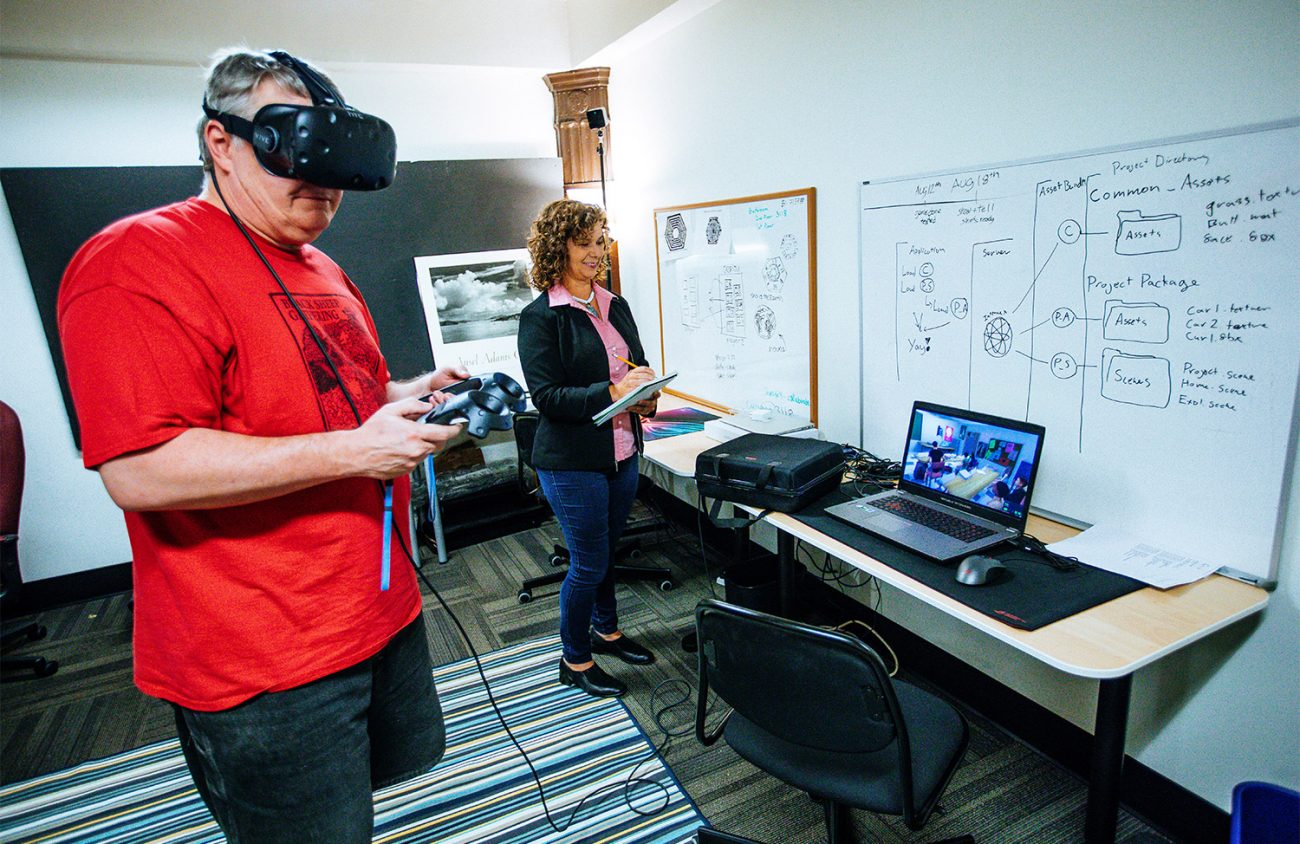I walk into Starve Ups, the tech incubator located above The Barn Light in downtown Eugene. The office is crowded, filled with wires and computers. A friendly face hands me a pair of virtual reality goggles — a heavy setup needing adjustment to fit my head.
Once my eyes focus, I am somewhere completely different. A bright middle-school classroom greets me, with real posters I recognize from my own education. The details are immaculate, from wadded-up pieces of paper to pencils sticking out of the ceiling.
I am told to look around, and I walk throughout the fictitious digital classroom. The imaginary students are diverse and move independently of one another. I am told that this test — a beta version of the program — does not yet contain the sounds I would normally hear, including the sounds students yelling and insulting me, attempting to coax me into stress.
I walk around, running into real-life tables that I can’t see from behind the goggles. I remove the mask, transported back to where I was before, ultimately confused but delighted.
This is a new form of education. This is the world of implicit bias training in virtual reality, or VR.
VR is no stranger to the world of video games — or to education, for that matter. Many applications have been developed to teach students at any age, from business development to counting apples. Virtual reality is still an expensive venture for many, which is why the classroom can be a great place to explore it (the headset is the most costly piece, along with a computer to run the apps).
Once you have the technology, the options become almost endless, with new apps being developed and released daily.
Creswell entrepreneur Wendy Morgan saw the opportunities VR provided and ran straight to Eugene’s Glimmer Technology to make her dreams come true.
Vance Naegle, cofounder of Glimmer Technology, has worked in game development for more than 25 years. He says he was enticed by this opportunity to branch out. He and his team are looking forward to using their game development skills for “something that seems a little more important,” as he puts it.
With Morgan’s help, their hope is to overcome implicit bias in the classroom with the help of the virtual landscape.
Implicit bias is an issue many have heard of recently, often in regards to the police training of “shoot, don’t shoot.” Many believe that racial profiling in police encounters negatively affects people of color.
The Kirwan Institute defines implicit bias as “the attitudes or stereotypes that affect our understanding, actions, and decisions in an unconscious manner.”
When it comes to education, studies show that black students are more likely to be disciplined than students of other races. Morgan’s project chips away at implicit bias in the classroom, hoping to create a more comfortable environment for both teachers and students. It can be incredibly difficult to teach these lessons without changing the learning environment.
Enlarge

How can you offer one of the most important lessons a teacher can learn without students or consequences? Morgan and her associates at Glimmer Technology found the answer in virtual reality.
The simulation they engineered takes educators into a classroom, where they are asked to teach a lesson to their computer-generated students. The students receive the lesson as real middle-schoolers would, hurling insults at the teacher and asking off-topic questions. The experience is used to heighten anxiety in the teachers, and then give them lessons on how to handle that stress.
This process helps them unlearn some of the implicit bias they possess as humans and as instructors. Morgan says of her own teaching experience that, “Getting immediate, real-time feedback would have made a world of a difference.”
Morgan is no stranger to the classroom, having worked as a K-12 teacher and substitute for nearly five years in Tulsa, Oklahoma, before coming to Oregon. She is now the president of Treadwell Ventures and a program development manager with the University of Oregon, keeping close to her educational roots.
Morgan aims to create an accessible training for educators across the nation. With the ability to train from one state and learn from another, it would be easier than ever to get the lesson to those who need it most.
So far, they have run the demo on 14 instructors who have amassed more than 140 years of teaching experience among them. Giving these lessons to the teachers was a mostly positive experience, despite being incredibly stressful for many of them. They learned how to channel their frustration and stress into positive energy they can send back into the classroom.
Time to digest the lesson is crucial, as instructors can reflect on the ways they can improve themselves and their students, allowing them to lay out their own biases before them.
Morgan says she hopes this project will progress into other implicit bias trainings for the police force. When asked how far she would like to go with this project, she responds with a smile on her face: “Mars is the limit!”
